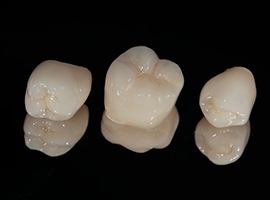Dental Crowns – Crown Point, IN
Ceramic Restorations to Bring Back Your Smile

What is a Dental Crown?

A dental crown is a customized restoration that is designed to fit over teeth that have become damaged in some way. Also known as caps, dental crowns are most typically used to restore teeth that have decayed as a result of plaque buildup breaking down and eroding enamel. However, this is far from their only use. They can also be helpful when a tooth has been chipped or cracked as a result of physical injury or treated following root canal therapy. We also use dental crowns to create more complex restorations like bridges or dentures. Whether you have damaged or missing teeth, dental crowns will likely be a part of your treatment plan if dental fillings are insufficient.
The Dental Crown Process

When you first arrive for your appointment, we’ll take a close look at your smile and determine if a dental crown can restore it effectively. If so, we’ll remove any decay if it is present, administer a local anesthetic to your surrounding gum tissue, then make a small modification to your affected tooth. This will allow us to create a crown that effectively fits over the top of it.
Once your tooth is modified, we’ll capture an impression and send it to a partnered dental lab to have your crown fabricated. You’ll wear a temporary crown in the meantime to protect your tooth and help you adjust to wearing a restoration. After about two weeks, you’ll come back to our office to have your permanent crown placed. The crown is made from lifelike dental ceramic, ensuring it blends in with your neighboring teeth as closely as possible.
The Benefits of Getting a Dental Crown

Not protecting your damaged tooth can cause it to break down further, resulting in more severe oral health problems later. With a dental crown, you can reduce the chances that you’ll need to have the tooth treated with root canal therapy (as a result of infection) or extracted outright.
You can also expect better comfort while chewing and speaking, two issues many patients experience when a tooth has become damaged. In some cases, patients will even choose crowns to cover cosmetic imperfections, such as chips, cracks, and stains (especially in teeth visible in their smile). With regular brushing and flossing, your restoration can even last for 15 years and longer!
Understanding the Cost of Dental Crowns

While a dental crown may be the best way to restore the structure, appearance, and function of your tooth, it’s perfectly reasonable to want to know how much the treatment will cost before you commit to it. During your consultation at our office in Crown Point, we’ll be happy to outline how much your restoration will cost and help you navigate your insurance plan and payment options. Here’s a quick guide to how dental crowns are priced at Berquist Family Dentistry, but please contact our staff online if you have any more questions.
Factors That Affect the Cost of Dental Crowns

The cost of your dental crown will be mostly determined by several factors, those being:
- The condition of the tooth: Severe damage may require a larger crown, which increases the cost of the restoration.
- Preliminary treatments: Some patients may need preliminary procedures such as a root canal, gum disease therapy, or dental implant placement before their crown can be attached. The cost of these treatments will be noted on your bill.
- The material used: Crowns can be made from a range of materials that come at different price points such as gold, porcelain, and amalgam. Each of these offers different advantages for the restoration, and we’ll be happy to explain the benefits of each of them during your consultation.
- How the crown is manufactured: Traditional dental crowns may cost less than same-day restorations.
It’s always important to remember that, with dental crowns as with everything else, you can expect to get what you pay for. The cheapest option is not always the best option, and a low-quality restoration may need early replacement or leave the patient vulnerable to oral injuries or infections. A high-quality crown can preserve the health of your tooth while giving you the confidence you need to make excellent first impressions at work and in social situations, which can lead to exciting opportunities and a better quality of life.
Does Dental Insurance Cover Dental Crowns?

Most dental insurance plans consider crowns to be restorative treatments, which means they are usually covered by 50% or more as long as they are medically necessary. However, each insurance policy is different, so we’ll have to review the details of your plan before we can determine how much it will pay. We’ll be happy to help you navigate your policy and payment options during your consultation so you can find the best way to fit your restoration into your budget.
Dental Crown FAQs
Are Dental Crowns Permanent?
While technically not permanent, dental crowns are definitely considered a long-term solution. In fact, on average, they can protect your tooth for up to15 years!
When your dentist reshapes your tooth for your new crown, this procedure is irreversible because your tooth enamel cannot grow back. Thus, your tooth will always need to have a crown for protection moving forward.
Crowns protect your underlying teeth from further damage, helping them survive for much longer than they would have otherwise.
You can ensure that your crown stays in excellent condition for years to come by maintaining proper oral hygiene, attending regular dental checkups and cleanings, and by wearing a mouthguard or nightguard as needed.
How Long Do Dental Crowns Last?
On average, most dental crowns last between five and fifteen years, but this depends on the materials used and how well you care for them.
Metal crowns typically last longer than metal-free crowns, however not necessarily. Also, this difference is frequently negligible.
More so than material used, the longevity of your dental crown depends on a variety of factors, including your diet, oral hygiene, and if you have any bad oral habits like smoking, teeth grinding, nail biting, or eating ice.
Crowns placed on the front teeth may also last slightly longer than crowns placed on molars, as these are not subjected to as much wear and tear from chewing.
Do Dental Crowns Get Cavities?
While technically it is impossible for a crown to develop a cavity, the tooth underneath a crown still can. In fact, a crowned tooth has about the same risk of tooth decay as one that is uncrowned!
Poor oral hygiene can allow bacteria and plaque to form around the gumline where the tooth meets the crown. It can then travel underneath the crown, wreaking havoc on the underlying tooth.
You can help prevent cavities in your crowned teeth in the same way you’d prevent them in any other tooth: with daily brushing and flossing, as well as regular dental checkups and cleanings.
Can Dental Crowns Be Whitened?
No matter what material your dental crown is made of it cannot be whitened like your natural teeth can.
Tooth enamel has tiny pores through which bleaching gels can enter and break apart stains. However, dental restorations like crowns do not. Therefore, your crown should always remain the same color.
Metal-free crowns are designed to blend in with your surrounding teeth as closely as possible.
To reduce the risk of your natural teeth becoming discolored and making your crown stand out in your smile, speak to your dentist about getting your teeth whitened before your crown is placed. That way, your crown can be matched to your ideal shade of white.








